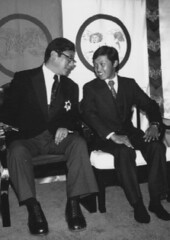Our trip to Ireland was loosely planned. We had general geographic locations, but no specific sites -- save one. The Aran Islands off the west coast. I'd been in love with them since I was a child and saw a photo essay in Life or Look or some other magazine I'd picked up some Sunday at my grandmother's house. They were desolate, spare, intriguing.
So the plan, then, once we got to Galway was to get up early and catch the first ferry at 10:30 to Inishmore. The second ferry didn't leave til 1.
We didn't make it. My traveling companion slept late and moved slowly, not feeling well. I miscalculated the distance. The drive was lovely, 80km an hour down narrow roads lined with stone walls, occasional ruins, and spare, bleak coastline. The clouds hung like a low ceiling so that you'd have to duck your head.
I assumed the ferry would have some touristy attractions, coffee shops, shopping shops, around it, basing my ferry experience on Cape Cod. The ferry from Ros a' Mhíl to Inis Mor is surrounded by fisheries and parking lots. We bought tickets and headed back to the main road, turning left (because left turns are easier when you're driving on the left), and heading into Connemara.
Connemara -- gorgeous word -- is in the Gaeltacht, where Irish is the language of everyday life. The signs were incomprehensible with words containing long strings of vowels and odd combinations of consonants, at least to our English-reading brains. We stopped in the first place that had more than two buildings and a bunch of parked cars. The best option was a coffee shop, where the vegan ate eggs and the gluten-sensitive person had fish and chips. The signs on the walls were in Irish.

The only other customers were a young family, father, mother, and round, potato-faced, happy toddler. He and I discovered we could play peekaboo around his mother's shoulder. He said something about me to his parents, who looked over, then laughed at him. (I'm guessing it was along the lines of "There's a funny lady." Look. "She's not funny -- you're funny!")
When we left, I said bye-bye. The family said something incomprehensible and long, that served as bye-bye.
We stopped in the grocery store for ferry snacks, and the clerk spoke to my companion in Irish. Companion apparently declined to get a bag for her purchases, walking over to me with full arms and a puzzled expression.
It was delightful, a step through the looking glass into another world.
The lesson? We could have been grumpy when things didn't go as planned. I was, in fact, wearing my cranky-pants as we parked the car, lamenting the short time we'd have on the island. "Well," my wise companion said, "There hours is better than not going there."
Aha.

And being open to what the moment offers brings you unexpected delights.
Life is an auspicious coincidence.


